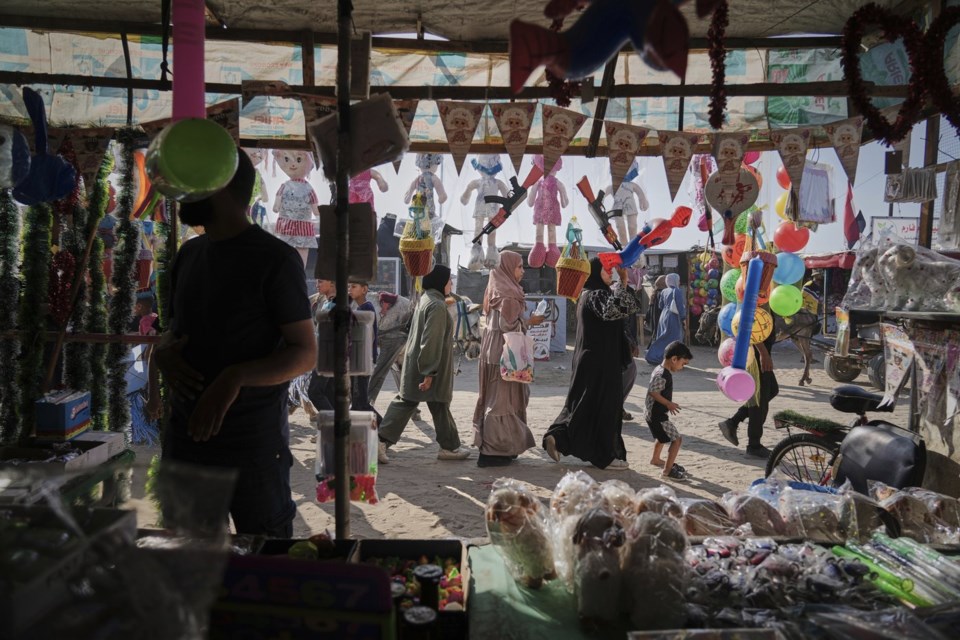MUWASI, Gaza Strip (AP) — With the Gaza Strip devastated by war and siege, Palestinians struggled Thursday to celebrate one of the most important Islamic holidays.
To mark Eid al-Adha — Arabic for the Festival of Sacrifice — Muslims traditionally slaughter a sheep or cow and give away part of the meat to the poor as an act of charity. Then they have a big family meal with sweets. Children get gifts of new clothes.
But no fresh meat has entered Gaza for three months. Israel has blocked shipments of food and other aid to pressure Hamas to release hostages taken in the Oct. 7, 2023, attack that started the war. And nearly all the territory’s homegrown sheep, cattle and goats are dead after 20 months of Israeli bombardment and ground offensives.
Some of the little livestock left was on sale at a makeshift pen set up in the vast tent camp of Muwasi in the southern part of Gaza’s Mediterranean coast.
But no one could afford to buy. A few people came to look at the sheep and goats, along with a cow and a camel. Some kids laughed watching the animals and called out the prayers connected to the holiday.
“I can’t even buy bread. No meat, no vegetables,” said Abdel Rahman Madi. “The prices are astronomical.”
The Eid commemorates the test of faith of the Prophet Ibrahim — Abraham in the Bible — and his willingness to sacrifice his son as an act of submission to God. The day is usually one of joy for children — and a day when businesses boom a bit as people buy up food and gifts.
But prices for everything have soared amid the blockade, which was only slightly eased two weeks ago. Meat and most fresh fruits and vegetables disappeared from the markets weeks ago.
At a street market in the nearby city of Khan Younis, some stalls had stuffed sheep toys and other holiday knickknacks and old clothes. But most people left without buying any gifts after seeing the prices.
“Before, there was an Eid atmosphere, the children were happy … Now with the blockade, there’s no flour, no clothes, no joy,” said Hala Abu Nqeira, a woman looking through the market. “We just go to find flour for our children. We go out every day looking for flour at a reasonable price, but we find it at unbelievable prices.”
Israel’s campaign against Hamas has almost entirely destroyed Gaza’s ability to feed itself. The U.N. says 96% of the livestock and 99% of the poultry are dead. More than 95% of Gaza’s prewar cropland is unusable, either too damaged or inaccessible inside Israeli military zones, according to a land survey published this week by the U.N.’s Food and Agriculture Organization.
Israel barred all food and other supplies from entering Gaza for more than two months. It eased the blockade two weeks ago to allow a trickle of aid trucks in for the U.N. to distribute. The trucks have brought in some food items, mainly flour. But the U.N. says it has struggled to delivery much of the incoming aid because of looting or Israeli military restrictions.
Almost the entire population of more than 2 million people have been driven from their homes, and most have had to move multiple times to escape Israeli offensives.
Rasha Abu Souleyma said she recently slipped back to her home in Rafah — from which her family had fled to take refuge in Khan Younis — to find some possessions she’d left behind.
She came back with some clothes, pink plastic sunglasses and bracelets that she gave to her two daughters as Eid gifts.
“I can’t buy them clothes or anything,” the 38-year-old said. “I used to bring meat in Eid so they would be happy, but now we can’t bring meat, and I can’t even feed the girls with bread.”
Near her, a group of children played on makeshift swings made of knotted and looped ropes.
Karima Nejelli, a displaced woman from Rafah, pointed out that people in Gaza had now marked both Eid al-Adha and the other main Islamic holiday, Eid al-Fitr, two times each under the war. “During these four Eids, we as Palestinians did not see any kind of joy, no sacrifice, no cookies, no buying Eid clothes or anything.”
___
Chehayeb reported from Beirut.
Mohammad Jahjouh And Kareem Chehayeb, The Associated Press



